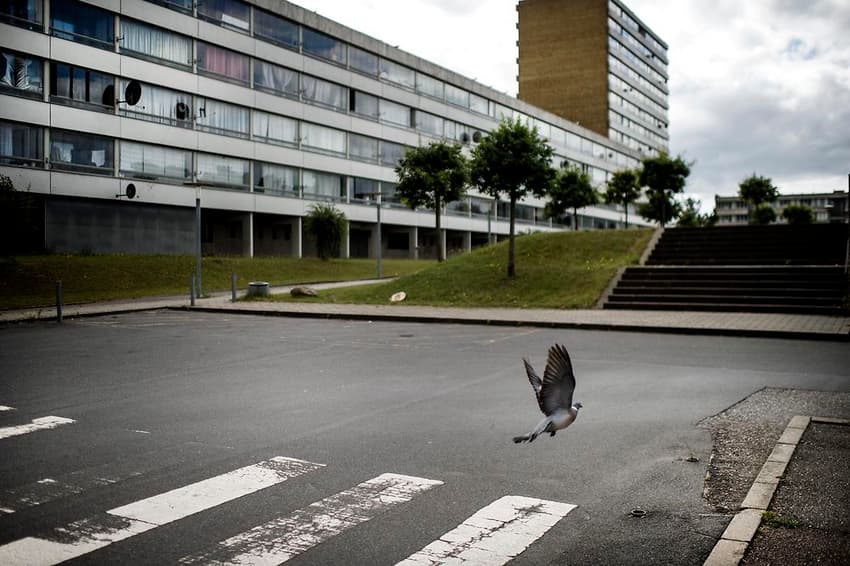Denmark cracks down on 'non-Western' neighbourhoods

Denmark plans to crack down further on disadvantaged neighbourhoods by reducing the number of "non-Western" residents, the Social Democratic government said Wednesday, scrapping the controversial term "ghetto" in its proposed legislation.
In the bill -- a review of existing legislation on combatting parallel societies -- the interior ministry proposed that the share of residents of "non-Western" origin in each neighbourhood be limited to a maximum of 30 percent within 10 years.
Denmark has for years had one of Europe's most restrictive immigration policies, which Social Democratic Prime Minister Mette Frederiksen has continued since coming to power in June 2019.
According to Interior Minister Kaare Dybvad Bek, too many non-Western foreigners in one area "increases the risk of an emergence of religious and cultural parallel societies," he said in a statement.
He said however that the term "ghetto", used to designate disadvantaged neighbourhoods, would be removed from the new legislation.
"The term ghetto is misleading... I think it contributes to eclipsing the large amount of work that needs doing in these neighbourhoods," he said.
Until now, the term was used legally to designate any neighbourhood of more than 1,000 people where more than half were of "non-Western" origin, and which met at least two of four criteria.
The four criteria are: more than 40 percent of residents are unemployed; more than 60 percent of 39-50 year-olds do not have an upper secondary education; crime rates three times higher than the national average; residents have a gross income 55 percent lower than the regional average.
READ ALSO: Danish government reduces number of areas officially termed ‘ghetto’
Fifteen Danish neighbourhoods currently fall into this category, and 25 others are considered "at risk". The list is updated each December.
In these neighbourhoods, misdemeanours carry double the legal penalties in place elsewhere, and daycare is mandatory for all children over the age of one or family allowances are withdrawn.
The existing legislation also calls for council homes in these areas to be reduced to 40 percent of available housing by 2030.
The bill will be discussed by Danish political parties and is expected to pass, though no date has been set for the vote.
According to Statistics Denmark, 11 percent of Denmark's 5.8 million inhabitants are of foreign origin, of whom 58 percent are from a country considered 'non-Western".
Comments
See Also
In the bill -- a review of existing legislation on combatting parallel societies -- the interior ministry proposed that the share of residents of "non-Western" origin in each neighbourhood be limited to a maximum of 30 percent within 10 years.
Denmark has for years had one of Europe's most restrictive immigration policies, which Social Democratic Prime Minister Mette Frederiksen has continued since coming to power in June 2019.
According to Interior Minister Kaare Dybvad Bek, too many non-Western foreigners in one area "increases the risk of an emergence of religious and cultural parallel societies," he said in a statement.
He said however that the term "ghetto", used to designate disadvantaged neighbourhoods, would be removed from the new legislation.
"The term ghetto is misleading... I think it contributes to eclipsing the large amount of work that needs doing in these neighbourhoods," he said.
Until now, the term was used legally to designate any neighbourhood of more than 1,000 people where more than half were of "non-Western" origin, and which met at least two of four criteria.
The four criteria are: more than 40 percent of residents are unemployed; more than 60 percent of 39-50 year-olds do not have an upper secondary education; crime rates three times higher than the national average; residents have a gross income 55 percent lower than the regional average.
READ ALSO: Danish government reduces number of areas officially termed ‘ghetto’
Fifteen Danish neighbourhoods currently fall into this category, and 25 others are considered "at risk". The list is updated each December.
In these neighbourhoods, misdemeanours carry double the legal penalties in place elsewhere, and daycare is mandatory for all children over the age of one or family allowances are withdrawn.
The existing legislation also calls for council homes in these areas to be reduced to 40 percent of available housing by 2030.
The bill will be discussed by Danish political parties and is expected to pass, though no date has been set for the vote.
According to Statistics Denmark, 11 percent of Denmark's 5.8 million inhabitants are of foreign origin, of whom 58 percent are from a country considered 'non-Western".
Join the conversation in our comments section below. Share your own views and experience and if you have a question or suggestion for our journalists then email us at [email protected].
Please keep comments civil, constructive and on topic – and make sure to read our terms of use before getting involved.
Please log in here to leave a comment.